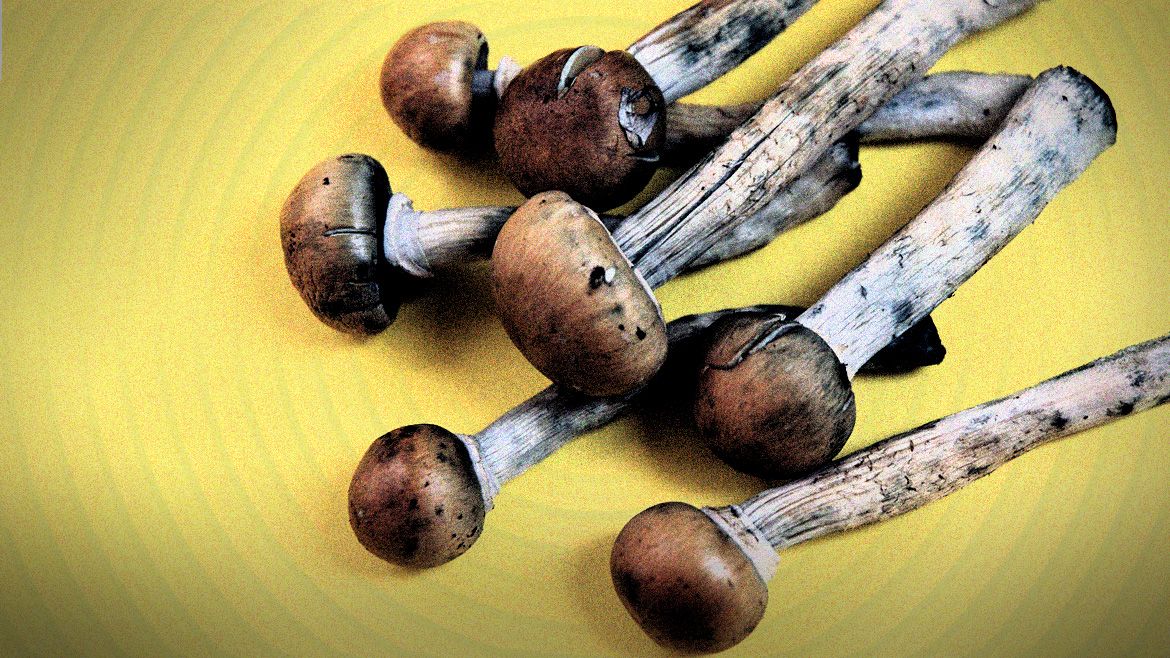Marijuana is becoming legal in more parts of the country, both medicinally and recreationally. A new group of advocates is following the pot playbook to change laws regarding hallucinogens, specifically magic mushrooms.
first city in the country to decriminalize psilocybin, the active ingredient in hallucinogenic mushrooms. A month later, the Oakland City Council did the same. Under decriminalization, psilocybin is still officially illegal, but city agencies do not enforce laws that ban it.” data-reactid=”18″>A small but growing campaign to legalize magic mushrooms has spread its spores into a handful of spots across the United States. In May, Denver became the first city in the country to decriminalize psilocybin, the active ingredient in hallucinogenic mushrooms. A month later, the Oakland City Council did the same. Under decriminalization, psilocybin is still officially illegal, but city agencies do not enforce laws that ban it.
Under federal law, psilocybin and similar hallucinogens are classified by the U.S. government as Schedule I drugs, substances with “no currently accepted medical use and a high potential for abuse.”
depression and anxiety. Magic mushrooms also come with a low risk of addiction, studies suggest. There is some evidence that psilocybin can help people break their addictions to other substances, specifically smoking.” data-reactid=”21″>Supporters of legalizing magic mushrooms point to evidence that the classification is incorrect on both counts. Recent research suggests psilocybin may be an effective treatment for psychological issues such as depression and anxiety. Magic mushrooms also come with a low risk of addiction, studies suggest. There is some evidence that psilocybin can help people break their addictions to other substances, specifically smoking.
Many of these benefits, some say, are present when users practice “microdosing” — taking a small amount that provides psychological benefits without creating a hallucinogenic effect. Microdosing can improve creativity and focus, practitioners report.
against allowing recreational use because of widely varying effects the drug can have on individuals — especially those with certain psychological conditions.” data-reactid=”23″>Federal law limits how much research can be done on psilocybin, meaning only a handful of studies to explore these claims have been conducted. Skeptics believe that much more research needs to be done before any conclusions can be drawn. Some scientists who advocate for the medical uses of magic mushrooms argue against allowing recreational use because of widely varying effects the drug can have on individuals — especially those with certain psychological conditions.
medical study of psilocybin and other psychedelics. An amendment that would have opened up more opportunities for research introduced by Rep. Alexandria Ocasio-Cortez failed in the House of Representatives in June.” data-reactid=”25″>Scientists have made some progress in creating space for more medical study of psilocybin and other psychedelics. An amendment that would have opened up more opportunities for research introduced by Rep. Alexandria Ocasio-Cortez failed in the House of Representatives in June.
California and Oregon by 2020. Similar campaigns have also started in Canada and Australia.” data-reactid=”26″>Meanwhile, the decriminalization movement looks to be gaining momentum. Mushroom activists are working to get decriminalization measures on the ballot in California and Oregon by 2020. Similar campaigns have also started in Canada and Australia.
NPR” data-reactid=”29″>“It’s really unprecedented in medical history to see effects for depression that are caused by a single medication.” — Johns Hopkins University researcher Matthew Johnson to NPR
Atlantic” data-reactid=”31″>“If Prozac had the effects observed in the best current studies on psychedelics, withholding it from the depressed or dying would be considered a human-rights violation as serious as failing, out of spite, to set a broken leg.” — Graeme Wood, Atlantic
Vice” data-reactid=”33″>“Unlike cannabis, it should be noted, decriminalizing psilocybin and other psychedelics doesn’t necessarily have to do with righting egregious criminal-justice wrongs or accumulating gobs of tax revenue to fund social projects. It’s more of a moral gesture, an assertion that people shouldn’t be getting arrested for altering their minds.” — Alex Norcia, Vice
Mashable” data-reactid=”35″>“Like it or not, the psilocybin decriminalization wave may be about to wash across America. … And if we’re going to enter this world, we can either allow another vast mega-business of mushroom concoctions, marketed in the same overboard manner as THC and CBD. Or we can bake in a more cautious, less commercial, microdosing-based approach from the start.” — Chris Taylor, Mashable
